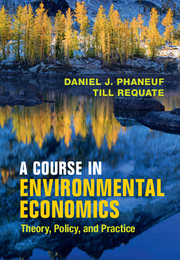Book contents
- Frontmatter
- Dedication
- Contents
- Figures
- Tables
- Preface
- Notational Conventions
- PART I ECONOMICS AND THE ENVIRONMENT
- PART II THE DESIGN OF ENVIRONMENTAL POLICY
- PART III VALUING THE ENVIRONMENT
- 14 Theory of Applied Welfare Analysis
- 15 Revealed Preference Models
- 16 Discrete Choice Models
- 17 Recreation
- 18 Property Value Models
- 19 Stated Preference Methods
- 20 Health Valuation
- PART IV THE PRACTICE OF ENVIRONMENTAL ECONOMICS
- References
- Author Index
- Subject Index
19 - Stated Preference Methods
from PART III - VALUING THE ENVIRONMENT
Published online by Cambridge University Press: 27 February 2023
- Frontmatter
- Dedication
- Contents
- Figures
- Tables
- Preface
- Notational Conventions
- PART I ECONOMICS AND THE ENVIRONMENT
- PART II THE DESIGN OF ENVIRONMENTAL POLICY
- PART III VALUING THE ENVIRONMENT
- 14 Theory of Applied Welfare Analysis
- 15 Revealed Preference Models
- 16 Discrete Choice Models
- 17 Recreation
- 18 Property Value Models
- 19 Stated Preference Methods
- 20 Health Valuation
- PART IV THE PRACTICE OF ENVIRONMENTAL ECONOMICS
- References
- Author Index
- Subject Index
Summary
In Chapter 14 we established the conceptual basis for non-market valuation and defined what we referred to as the fundamental challenge of welfare measurement. In particular, we noted that the absence of observable demand behavior for most environmental and other public goods requires additional assumptions or extra-market information to measure their value. Up to this point in Part III of the book we have focused on additional assumptions as a solution to the fundamental challenge. We have seen that in many instances, assertions about the relationship between the environmental or public good and a related private commodity can be used to link behavioral functions, which are estimable from actual behavior, to values for environmental goods. Examples of this type of revealed preference approach were discussed in Chapter 17 for recreation and Chapter 18 for property markets.
In this chapter, we turn our attention to an alternative strategy that uses surveys to obtain the data needed for welfare measurement. Stated preference (SP) methods use information on how respondents say they would behave in carefully constructed hypothetical situations, and so in contrast to revealed preference (RP) methods, there is no need to observe actual behavior. Stated preference methods are in fact quite general and have been used for decades in a variety of social science fields. Carson and Louviere (2011, p.541) present a definition that is almost a tautology when they note that “a stated preference survey is a survey that asks agents questions that embody information about preferences”. Seen in this light, familiar classes of surveys used in marketing (which of these would you buy?) and political polling (who will you vote for?) are examples of stated preference applications. Our interest is specifically in stated preference valuation methods in which answers to questions lead directly or indirectly to measures of economic value for a commodity that is being studied.
Stated preference valuation surveys in environmental economics typically focus on a well-defined environmental commodity, and usually present questions using one of the following three stylized formats, where B denotes an amount of money:
• Would you be willing to pay $B to have this improvement in resource quality?
• Which from among the following three resource quality and cost combinations would you select?
• How would your use of the resource change if the quality was improved to this level?
- Type
- Chapter
- Information
- A Course in Environmental EconomicsTheory, Policy, and Practice, pp. 572 - 616Publisher: Cambridge University PressPrint publication year: 2016



